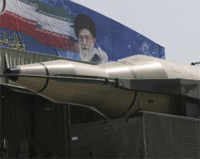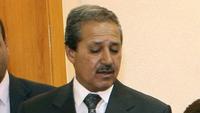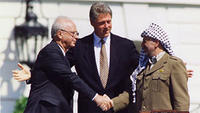-
Iran could test-fly ICBMs capable of striking U.S. within three years: Pentagon

A Pentagon report submitted to Congress on 29 June says Iran continues to make large strides in virtually all conventional, unconventional, and nuclear categories; the report focused most extensively on Iran’s inventory of ballistic missiles, and warned that Iran may be able to test-fly an inter-continental ballistic missile (ICBM), capable of striking American soil, within three years’ time; Iran also continues to supply men, money, training, and even sophisticated weapons systems to some of the world’s best-known terror groups
-
-
Space radiation detection technology to be used for homeland security
Common radioactive sources emit gamma rays while nuclear bomb material emits both gamma rays and neutrons; because neutrons and gamma rays are electrically neutral, it is difficult to ascertain properties such as the direction of origin or energy level of the radioactive source; University of New Hampshire scientists are re-engineering instruments originally built for detecting radiation in space for homeland security purposes
-
-
Another top Syrian defection signals growing Sunni disaffection

Nawaf Fares, Syria’s ambassador to Iraq, has defected and joined the anti-Assad forces; Fares is also the chief of the Sunni tribe Uqaydat, which controls long stretches of the border area between Syria and Iraq; since 1970, one of the central motifs of the Assad regime – father and son – has been an emphasis on cohesion among the Syrian people in an effort to unify the diverse Syrian society; the regime has enjoyed the support of Alawites, Druze, Christians, and moderate Sunnis; the defection of a second leading Sunni supporter of the regime in as many weeks — Brig. Gen. Manaf Tlas defected last week – is one more indication that Syrian society is fracturing along ethnic and religious lines
-
-
UN includes Iran in drafting treaty aiming to stop arms proliferation to terrorists, rogue states

The UN Conference of the Arms Trade Treaty is tasked with drafting an international treaty aimed at stopping arms proliferation to terrorist groups and rogue states; the UN appoints Iran to be one of the vice presidents of the committee; the UN Watch watchdog groups says that appointing Iran to oversee the drafting of a treaty dealing with sending arms to terrorists “is like choosing Bernie Madoff to police fraud on the stock market”
-
-
Training the nuclear forensics experts of the future
Ten percent of the U.S. experts in nuclear and radiochemistry are at or nearing retirement age, according to a recent report from the National Academies of Science; meanwhile, not enough students are being trained to take their places; undergraduate summer programs in nuclear forensics and nuclear chemistry aim to replenish the ranks
-
-
California passes “Anti-Arizona” immigration measure

The California State Senate last Thursday passed Assembly Bill 1081 — some call it the Anti-Arizona law — under which local police officers would be limited to refer only those individuals convicted of serious felonies to immigration agencies; police officers would no longer have authority to detain lower-level offenders on their undocumented status
-
-
Study: Islamist extremists emphasize self-defense, not world domination
A common belief in the West is that al Qaeda wishes to impose Islam everywhere; this might be a pipe dream for the group, but a new study of their use of religious texts suggests that Islamists’ goals are much more modest
-
-
Deadline for ASIS Accolades Competition approaches
ASIS International 58th Annual Seminar and Exhibits will be held in Philadelphia on 10-13 September; one of the highlights of the show is the ASIS Accolades Competition, which is open to exhibitors in the event; Deadline for Submissions is 23 July
-
-
Many criminals who used guns in a crime were not legally barred from possessing firearms

Sixty percent of persons incarcerated for gun crimes in the thirteen U.S. states with the most lax standards for legal firearm ownership were not legally prohibited from possessing firearms when they committed the crime that led to their incarceration
-
-
New book confirms Israel behind killing of Iran nuclear scientists
A book to be published today offers details about, Israel’s campaign to take out Iranian nuclear scientists, a campaign which is part of the Israel’s broader effort to prevent Iran from acquiring nuclear weapons; the book also says that the cyber campaign against Iran’s nuclear program was an Israeli innovation, not an American one as recently reported; it was the brainchild of Israel’s military intelligence agency (AMAN) and Unit 8-200 — Israel’s equivalent of the eavesdropping, code-breaking National Security Agency (NSA) — and endorsed by the White House at Israel’s suggestion
-
-
Experts: If Arafat was poisoned, it was not by polonium-210
In a report last week, Al Jazeera claimed that the cause of Yasser Arafat death in 2004 was poisoning by the radioactive substance polonium-210, and that Swiss scientists found high concentrations of polonium in the cloths Arafat wore in his last days; experts say that the laws of physics make this theory impossible: Polonium-210 has a half-life of 138 days, meaning that half of the substance decays roughly every four-and-a-half months; since only miniscule amounts of the substance would suffice to kill someone, it is not possible that eight years after Arafat’s death, such high levels of the material would still be found in his belongings; put another way: for polonium-210 to be discovered today in Arafat’s clothing at such high levels would mean that such large quantities of the material had to be used – unnecessarily — eight years ago, that not only Arafat, but his entourage and many of the doctors, nurses, and patients at the Hôpital d’instruction des armées Percy where he was treated would be dead as well of radiation poisoning
-
-
ACLU-sponsored app keeps police accountable
A new app from the ACLU of New Jersey allows people securely and discreetly to record and store interactions with police, as well as provide legal information about citizens’ rights when interacting with the police
-
-
Fort Hood incident report calls for sweeping changes in FBI’s approach

A report of the 2009 Fort Hood shooting will recommend eighteen specific changes which will make the FBI more likely to detect such insider threats earlier; the report, written by William Webster, the former director of the FBI, will be on the desk of Robert Mueller, the current FBI director, next week; the report’s authors focused on the FBI and the agency’s more than a hundred Joint Terrorism Task Forces (JTTFs) and how they handled and acted on counterterrorism intelligence before and after the shootings … and the FBI’s remedial measures in the aftermath of Fort Hood
-
-
Did Arafat die of radioactive poisoning?

When Yasser Arafat was taken seriously ill in October 2004, and then died in a Paris hospital the next month, many Palestinians charged that he was poisoned by the Israeli Mossad; his widow refused to permit an autopsy, so the poisoning theory could never be proved; now, Swiss scientists who examined items of clothing Arafat wore in his last days say these items contain a significant – and highly unusual – levels of polonium-210, a toxic radioactive material; the Russian secret service used polonium in 2006 to kill Alexander V. Litvinenko, a former KGB agent who became a critic of Putin’s Russian government; Arafat’s widow and the Palestinian Authority call for Arafat body to be exhumed to determine whether or not he was poisoned
-
-
A third Bell 412 helicopter delivered to NYPD for counterterrorism missions

The NYPD dedicated many hours to designing the specifications of the department’s third Bell 412 to meet the diverse needs of the police department; one of the counterterrorism additions to the Bell 412 is a radiation detection system that can identify radiation signatures from an altitude of 200 feet in an effort to protect the city from nuclear bomb threats
-
More headlines
The long view
Factories First: Winning the Drone War Before It Starts
Wars are won by factories before they are won on the battlefield,Martin C. Feldmann writes, noting that the United States lacks the manufacturing depth for the coming drone age. Rectifying this situation “will take far more than procurement tweaks,” Feldmann writes. “It demands a national-level, wartime-scale industrial mobilization.”
No Nation Is an Island: The Dangers of Modern U.S. Isolationism
The resurgence of isolationist sentiment in American politics is understandable but misguided. While the desire to refocus on domestic renewal is justified, retreating from the world will not bring the security, prosperity, or sovereignty that its proponents promise. On the contrary, it invites instability, diminishes U.S. influence, and erodes the democratic order the U.S. helped forge.
Fragmented by Design: USAID’s Dismantling and the Future of American Foreign Aid
The Trump administration launched an aggressive restructuring of U.S. foreign aid, effectively dismantling the United States Agency for International Development (USAID). The humanitarian and geopolitical fallout of the demise of USAID includes shuttered clinics, destroyed food aid, and China’s growing influence in the global south. This new era of American soft power will determine how, and whether, the U.S. continues to lead in global development.
Water Wars: A Historic Agreement Between Mexico and US Is Ramping Up Border Tension
As climate change drives rising temperatures and changes in rainfall, Mexico and the US are in the middle of a conflict over water, putting an additional strain on their relationship. Partly due to constant droughts, Mexico has struggled to maintain its water deliveries for much of the last 25 years, deliveries to which it is obligated by a 1944 water-sharing agreement between the two countries.
How Disastrous Was the Trump-Putin Meeting?
In Alaska, Trump got played by Putin. Therefore, Steven Pifer writes, the European leaders and Zelensky have to “diplomatically offer suggestions to walk Trump back from a position that he does not appear to understand would be bad for Ukraine, bad for Europe, and bad for American interests. And they have to do so without setting off an explosion that could disrupt U.S.-Ukrainian and U.S.-European relations—all to the delight of Putin and the Kremlin.”
How Male Grievance Fuels Radicalization and Extremist Violence
Social extremism is evolving in reach and form. While traditional racial supremacy ideologies remain, contemporary movements are now often fueled by something more personal and emotionally resonant: male grievance.
